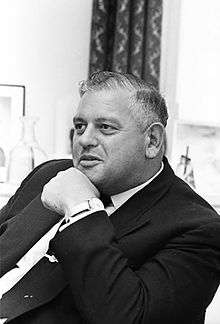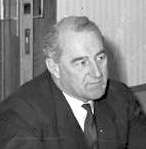New Zealand general election, 1972
| | |||||||||||||||||||||||||||||||||||||||||||||||||||
| |||||||||||||||||||||||||||||||||||||||||||||||||||
| |||||||||||||||||||||||||||||||||||||||||||||||||||
| |||||||||||||||||||||||||||||||||||||||||||||||||||
The New Zealand general election of 1972 was held on 25 November to elect MPs to the 37th session of the New Zealand Parliament. The Labour Party, led by Norman Kirk, defeated the governing National Party.
Background
The National Party had been in office since the 1960 elections, when it had defeated the ruling Labour Party, led by Walter Nash. The Second Labour Government was the shortest-lasting of all New Zealand governments to that day; in contrast, the Second National Government, led for the majority of its tenure by Keith Holyoake, would be re-elected three times. National's policies were focused around stability and a "steady as she goes" approach, but Holyoake's Government was increasingly perceived as tired and worn-out. In February 1972, Holyoake stood aside and was replaced by his deputy, Jack Marshall, who took steps to reinvigorate the party.
Meanwhile, Norman Kirk had been at the helm of Labour since 1965. In this time, he had been modernising and updating the Labour Party, but narrowly lost the 1969 election. Kirk slimmed and dressed to improve his image, and visited several overseas Labour parties to broaden his knowledge. He activated a "spokesman" or shadow cabinet system to spread the responsibility, though it was difficult to avoid one composed largely of Auckland and Christchurch members. Despite these improvements, commentators speculated whether National would pull off another cliff-hanger victory. Economic recession and voter fatigue hurt National at the polls. Labour's slogan was "It's Time – Time for a change, time for Labour", which expertly captured the national mood.
1972 electoral redistribution
Since the 1969 election, the number of electorates in the South Island was fixed at 25, with continued faster population growth in the North Island leading to an increase in the number of general electorates. Including the four Māori electorates, there had been 80 electorates since the 1902 election.[1] This increased to 84 electorates through the 1969 election.[2] The 1972 electoral redistribution saw three additional general seats created for the North Island, bringing the total number of electorates to 87.[3] Together with increased urbanisation in Christchurch and Nelson, the changes proved very disruptive to existing electorates. Only two South Island electorates were not altered by the redistribution (Clutha and Lyttelton).[4] Only eight of the North Island electorates were not altered (Franklin, Gisborne, Hobson, Island Bay, Miramar, North Shore, Tamaki, and Wairarapa).[3]
In the South Island, three electorates were abolished (Buller, Westland, and Selwyn), and three electorates were newly created (Rakaia, Tasman, and West Coast).[5] In the North Island, five electorates were abolished (Hauraki, Marsden, Otaki, Waimarino, and Waitomo), two electorates were recreated (Coromandel and Otahuhu), and six electorates were newly created (East Coast Bays, Hamilton East, Kapiti, King Country, Ruahine, and Whangarei).[6]
The election
The date for the 1972 elections was 25 November, a Saturday. 1,583,256 people were registered to vote, and there was a turnout of 89.1%. This turnout was slightly higher than the previous election, and considerably higher than the following one. The number of electorates being contested was 87.[3]
Results
The 1972 election saw the Labour Party defeat the governing National Party, winning 55 seats to National's 32. Labour was therefore able to form its first government since 1960, with Norman Kirk becoming Prime Minister. The second National government thus gave way to the third Labour government. No minor parties managed to gain seats, and no independents were elected. There were 1,583,256 electors on the roll, with 1,401,152 (88.50%) voting.

| Party | Candidates | Total votes | Percentage | Seats won | Change | |
|---|---|---|---|---|---|---|
| Labour | 87 | 677,669 | 48.37 | 55 | +16 | |
| National | 87 | 581,422 | 41.50 | 32 | -13 | |
| Social Credit | 87 | 93,231 | 6.65 | - | ±0 | |
| Values | 42 | 27,467 | 1.96 | - | ±0 | |
| New Democratic | 86 | 8,783 | 0.63 | - | ±0 | |
| Liberal Reform Party | 24 | 4,077 | 0.29 | - | ±0 | |
| Independent | 43 | 8,503 | 0.61 | - | ±0 | |
| Total | 456 | 1,401,152 | 87 | +3 | ||
Votes summary
The table below shows the results of the 1972 general election:
Key
National Labour Social Credit Independent
Table footnotes:
- ↑ Bruce Beetham came third for Social Credit in Rangitikei
- ↑ Shand was first on election night, but lost when special votes were included
- ↑ Julian Watts was a son of Jack Watts
Notes
- ↑ McRobie 1989, p. 67.
- ↑ McRobie 1989, p. 111.
- 1 2 3 McRobie 1989, p. 115.
- ↑ McRobie 1989, p. 116.
- ↑ McRobie 1989, pp. 112, 116.
- ↑ McRobie 1989, pp. 111, 115.
- ↑ Norton 1988, p. 210.
- ↑ Norton 1988, p. 213.
- ↑ Norton 1988, p. 215.
- ↑ Gustafson 1986, p. 371.
- ↑ Norton 1988, p. 229.
- ↑ Norton 1988, p. 241.
- ↑ Norton 1988, p. 243.
- ↑ Gustafson 1986, p. 354.
- ↑ Gustafson 1986, p. 382.
- ↑ Norton 1988, p. 360.
- ↑ Gustafson 1986, p. 388.
References
- Chapman, George (1980). The Years of Lightning. Wellington: AH & AW Reed. ISBN 0-589-01346-7.
- Gustafson, Barry (1986). The First 50 Years : A History of the New Zealand National Party. Auckland: Reed Methuen. ISBN 0-474-00177-6.
- Templeton, Ian; Eunson, Keith (1972). In the Balance: Election '72. Dunedin: John McIndoe.
- Edwards, Brian, ed. (1973). Right Out: Labour Victory ’72. Reed. ISBN 0-589-00801-3.
- McRobie, Alan (1989). Electoral Atlas of New Zealand. Wellington: GP Books. ISBN 0-477-01384-8.
- Norton, Clifford (1988). New Zealand Parliamentary Election Results 1946-1987: Occasional Publications No 1, Department of Political Science. Wellington: Victoria University of Wellington. ISBN 0-475-11200-8.
- Wilson, James Oakley (1985) [First published in 1913]. New Zealand Parliamentary Record, 1840–1984 (4th ed.). Wellington: V.R. Ward, Govt. Printer. OCLC 154283103.

